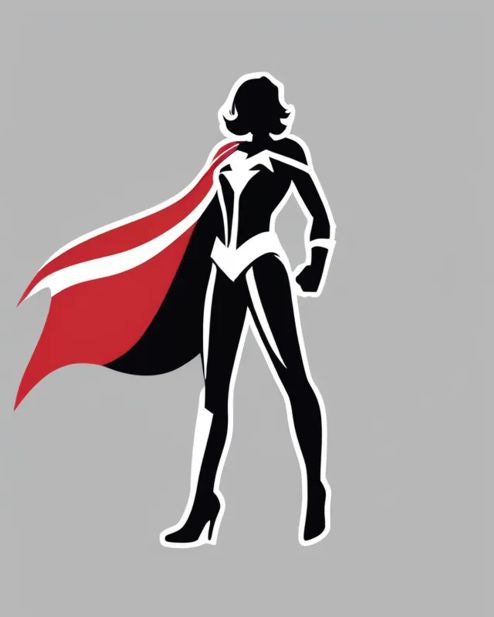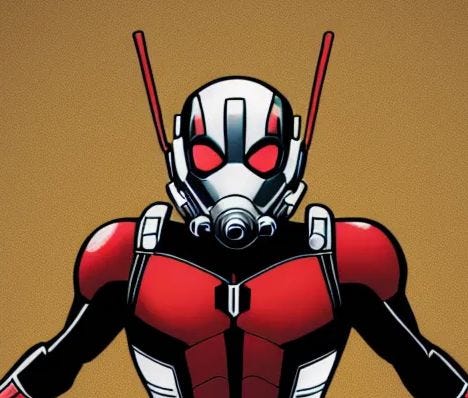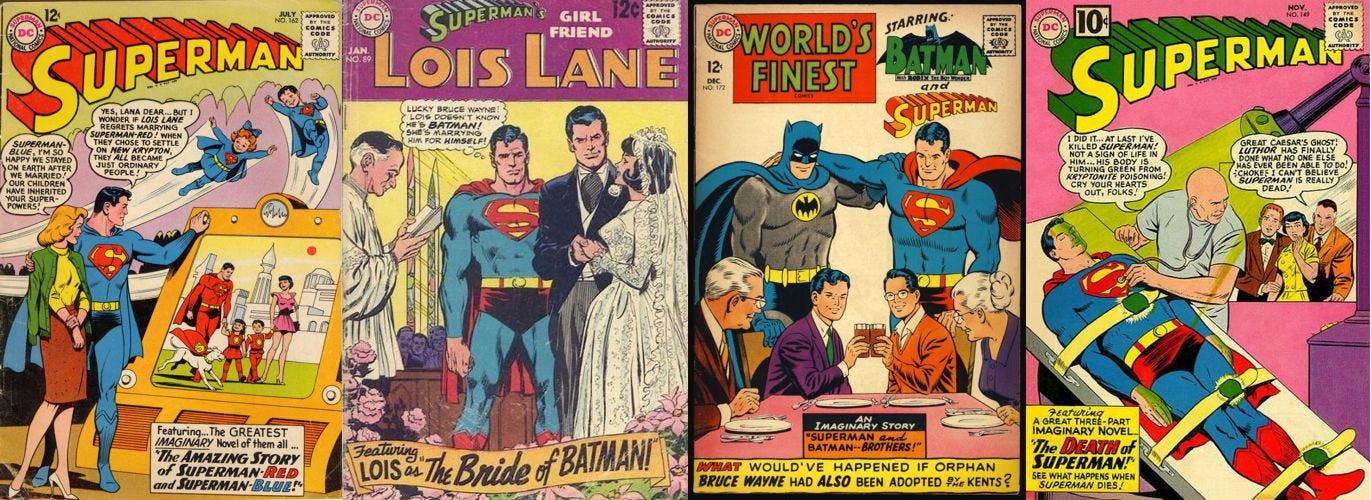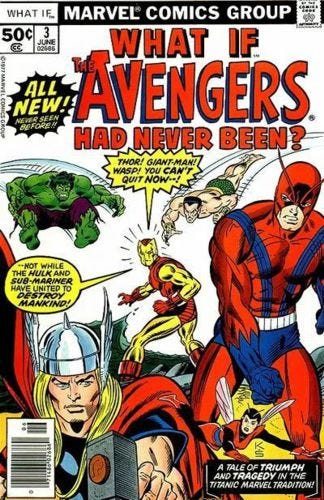Imaginary Stories, the Multiverse, and The War on Culture
What to do when people want to poison traditional works and take them from you
While I've been tinkering and dithering writing this post, Nick Enlowe has written an article that expresses similar views to those you will find here. While I only discovered his article midway through my scribbles, I wanted to call it out and link it for your perusal.
Treating “Official” Fan Fiction From The Comic Industry Like It’s Fan Fiction
Nick also has a Substack that you should check out as well. Get on it!
There's been a lot of ink spilled, both real and virtual, over the use of intellectual properties (IP) in the 21st Century. New and old, creators and corporations are vigorously utilizing original materials or purchased IPs to create spin-off movies, video games, cartoons and anime, or even derivative written works from classic and famous works of fiction, modern novels, and comic books.
Examples would be movies based on J.R.R Tolkien's Lord of the Rings and The Hobbit, a TV/Video production based on Robert Jordan's Wheel of Time series of books, and, of course, the big budget superhero films starring comic book characters from both Marvel Comics and DC Comics.
Some people have concerns that along the path of exploiting these properties for maximal material gain, the popular zeitgeist of the dominant media and left-leaning culture has corrupted these adaptations. These IP maintainers engaged in changing the creators' messages from what was originally set down to ones that reflect debased modern values, non-traditional mores, and rampant political hectoring for narrow and unproven (or even failed) worldviews.
Comparing the original works to these entertainment products of the Current Age shows that these concerns are mostly factual. Traditional stories are under attack by modernist IP owners or licensees with what must be assumed to be anything from careless indifference to malicious intent based on the end result of their work. Stories by masterwork authors are twisted to the political and societal whims of significantly lesser talents who have axes to grind. Popularity of well-known characters is torn away from the original and worn like a skin by shallow caricatures who mouth their puppeteers' hatred for what the original characters (or even author) said, or based upon the implied stances on matters of society, culture, and religious faith.
Readers or viewers of the famous original works are noticeably concerned that these cherished properties may become forever tainted, destroyed, or even locked away for lengthy periods under Copyright and Trademark laws that have not kept pace with the times. Worse, some say, is that the newer works destroy the old ones by virtue of twisting the meaning or direction. The modernist direction poisons the whole chain of the works onto which the new work is linked.
The assumption by many lovers of these works is that once the new materials are printed/pressed/stamped/encoded, the new items must be treated as part of the work's whole, joining it inevitably and inexorably to the old cherished materials.
"How can we stop it? What can we do?", they ask.
If you are one of those people, what is there to do? What can be done to preserve these things that you enjoy? Well, let's first take a side trip into comic books, television, movies, and a special dive into the old USENET archives. Once we are done there, then we'll look at what I've done to solve the problem for myself. See if it makes any sense for you.
Long before the Internet (circa 1992), there were a host of text-based bulletin boards, data storage sites, and shareware repositories available via FTP, Telnet, Gopher, and other protocols. USENET became popular with it's detailed categories of specific discussion and related files for download. Of course, just as with the modern Internet, porn quickly made its way to these early communication and storage mechanisms. Yes, Rule 34 ("If it exists, there is porn of it") was alive and well on these early boards and sites.
One of the items you might find there was something called "Slash Fiction" or "SlashFic". This was fan fiction material produced by fans of various television and movie franchises, often with a sexual overtone, and often with graphic descriptions of sex acts, and very often involving characters of the same sex. One of the most famous of these SlashFic categories was re-imagining the Captain Kirk and Mr Spock relationship as something other than what was shown on TV or in the movie theaters. This 'genre' of SlashFic was termed Kirk/Spock slash fiction (or Kirk slash Spock). Kirk and Spock were portrayed as a homosexual couple in various phases of a relationship. For more background on SlashFic, see the following links:
This specific type of fan-produced story was a popular "shipping" staple of the proto-Internet, where shipping equals 'relationship'. Other characters found their way into their own categories of SlashFic depicting relationships that fans imagined might exist if they wrote the characters. Various characters from literature, to included Sherlock Holmes and Doctor Watson, many comic book superheroes and villains, popular television and movies characters, and even pop culture figures became grist for the SlashFic mill. SlashFic found its way to the Internet with the rest of Porn in the early 90s.
Question: If you were a fan of Star Trek, how would you (or did you) respond to discovering that these Kirk/Spock SlashFic stories existed? How did you think they related to the actual episodes and characters as depicted on TV and in the movies?
Jot your answers down for the quiz coming later in this article.
If you were a comic book reader in the 1950s and 1960s, or you dive back in time with your ComiXology account (whoops, just ‘Amazon’ now, I guess), you'd find a wealth of comics by National Periodicals (known as DC Comics after 1977) that featured what were called “imaginary stories”.
Many authors of Superman and Batman books, to include Pulp and SF greats, Edmond Hamilton, Otto Binder, Gardner Fox, and others, would create stories that were not part of the mainline continuity of the book. These stories might involve Batman getting married, or the Death of Superman (yeah, long before that cash-grab aberration of the early 90s), or maybe Lois Lane gets superpowers and Superman needs rescuing.
They made for fun jaunts of "What if...?" (oops, that's the imaginary stories from Marvel in the 70s.)
But, you didn't have take the imaginary stories seriously, because they were not part of the continuity of the main series. They could be ignored if you wanted to ignore them. They were like … fan fiction.
You see where we are heading to yet?
Here are some links to "imaginary stories" in case you want more background on this concept:
With this information, we go back to our problem at hand: what do you do as people who now manage these IPs do their utmost to sexualize, pervert, and destroy these properties? How do you fight back?
Take them at their word and act accordingly, of course.
Marvel says there are an infinite number of universes and all kinds of different things happen there. Great. My universe doesn't have any of the anti-civilization drek you pumped out in the last 30+ years.
DC says that there are such things as imaginary stories. Great. The slop you are pushing and have pushed for decades is all imaginary to me now. You just didn’t label it correctly. Fixed it for you.
Map this to any form of entertainment that you enjoy. Curate, cull, purge, and protect.
Here is my step-by-step solution applied to comic books. It's only two steps:
Collect the materials you determine to best represent the property, preferably in hardcopy. If not hardcopy, then the most durable electronic archive formats you can find.
For collectors, this part is going to be harder than for people who enjoy the material in a more casual fashion: You need to cull the garbage from your collection. Cut it out from your life entirely. Ignore that it exists or that it ever existed. In your universe, it never happened. And by ignoring it, use the Marvel Multiverse model and the DC Imaginary Story model to dispose of any materials that fall into the IP destroying category.
Those odious materials from Current-year Marvel were part of Earth-666 or maybe Dark Phoenix's Dolorous Daughter's Dimension. Not yours. Never yours. Ever.
These garbage-tier takes that keep rolling out from Current-year DC? Imaginary Stories, baby. All made up and can be completely ignored. Fan fiction of the most mediocre kind. Flush twice.
Introduce others to your curated materials if they express interest in these IPs. Be very explicit about what to read and what to avoid. Tell them that the stuff you are recommending they ignore is like the worst fan fiction from the web, and it's not worth their time. You won't be lying.
Yeah, that is it. That is my solution. The twisted modern garbage is imaginary or from another universe that does not matter to me. Let the Current Year manure rot down in its own fan fiction universe apart from Civilization.
Pass to following generations the stuff that is worthy and promotes a healthy and growing culture. Enjoy your entertainment without fear.







